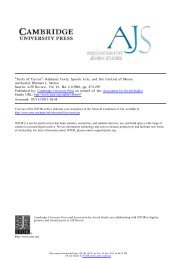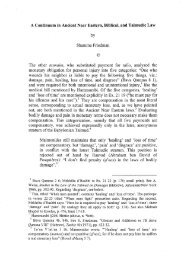Torah in the Mouth.pdf
Torah in the Mouth.pdf
Torah in the Mouth.pdf
Create successful ePaper yourself
Turn your PDF publications into a flip-book with our unique Google optimized e-Paper software.
<strong>Torah</strong> <strong>in</strong> <strong>the</strong> <strong>Mouth</strong>, Writ<strong>in</strong>g and Oral Tradition <strong>in</strong> Palest<strong>in</strong>ian Judaism, 200 BCE - 400 CE<br />
Jaffee, Mart<strong>in</strong> S., Samuel and Al<strong>the</strong>a Stroum Professor of Jewish Studies, University of Wash<strong>in</strong>gton<br />
Pr<strong>in</strong>t publication date: 2001, Published to Oxford Scholarship Onl<strong>in</strong>e: November 2003<br />
Pr<strong>in</strong>t ISBN-13: 978-0-19-514067-5, doi:10.1093/0195140672.001.0001<br />
significance is designed to exclude Gentiles from covenantal consideration.<br />
Clearly, <strong>the</strong> “Nations of <strong>the</strong> World” who seek to appropriate Israel's precious heritage of <strong>Torah</strong> are not <strong>the</strong> pagan conquerors of Israel, but<br />
<strong>the</strong>ir Christian successors now rul<strong>in</strong>g Byzantium. The passage counters Christian <strong>the</strong>ological supercessionism, grounded <strong>in</strong> a<br />
hermeneutical appropriation of Jewish Scripture, with <strong>the</strong> bold claim that possession of Scripture alone is no sign of covenantal partnership<br />
with God. The midrashist claims that it is precisely <strong>the</strong> fact that part of <strong>the</strong> <strong>Torah</strong> is carried solely <strong>in</strong> <strong>the</strong> memory and <strong>the</strong> mouth, ra<strong>the</strong>r<br />
than <strong>in</strong> a book, that preserves <strong>the</strong> uniqueness of Israel. The <strong>in</strong>corporation of <strong>Torah</strong> <strong>in</strong>to <strong>the</strong> body through memorization and enactment<br />
functions no less surely than that o<strong>the</strong>r mark on <strong>the</strong> body—circumcision—to dist<strong>in</strong>guish Israel from those who would supplant it <strong>in</strong> God's<br />
favor.<br />
The same Midrash of Rabbi Tanhuma (ed. Buber, vayera 6, 44b), and a roughly contemporary Palest<strong>in</strong>ian collection known as Pesiqta<br />
Rabbati (ed. Friedmann, 14b), share a close parallel to this passage, gloss<strong>in</strong>g it <strong>in</strong> even stronger language. S<strong>in</strong>ce <strong>the</strong><br />
end p.145<br />
Pesiqta Rabbati passage is slightly more ample, we will use it as our text. Hear how <strong>the</strong> conversation between <strong>the</strong> Holy One and Moshe is<br />
reconstructed by Rabbi Yehudah bar Shalom <strong>in</strong>to a dialogue between <strong>the</strong> Holy One and Byzantium:<br />
The Blessed Holy One foresaw that <strong>the</strong> Nations would translate <strong>the</strong> [Written] <strong>Torah</strong> and read it <strong>in</strong> Greek. And <strong>the</strong>y would say:<br />
“They [i.e., <strong>the</strong> Jews] are not Israel!” 60 Said <strong>the</strong> Blessed Holy One to Moshe: “O Moshe! The Nations will say, ‘We are Israel! We<br />
are <strong>the</strong> children of <strong>the</strong> Omnipresent!’ And Israel, too, will say, ‘We are <strong>the</strong> children of <strong>the</strong> Omnipresent!’”<br />
And <strong>the</strong> scales are <strong>in</strong> balance!<br />
Said <strong>the</strong> Blessed Holy Ones to <strong>the</strong> Nations: “What do you mean that you are my children? But I recognize only <strong>the</strong> one who holds<br />
my mystery <strong>in</strong> his hands. He alone is my son!”<br />
They said to Him: “What is this mystery?”<br />
He replied: “It is <strong>the</strong> Repeated Tradition!”<br />
Here <strong>the</strong> crucial word, translated as mystery, is <strong>the</strong> Aramaic mistoryn, a borrow<strong>in</strong>g from <strong>the</strong> Greek mysterion. As M. Bregman has recently<br />
demonstrated, this rabb<strong>in</strong>ic appeal to <strong>the</strong> “mystery” of <strong>the</strong> Repeated Tradition is hardly a result of random chance. 61 It corresponds most<br />
directly to a precisely parallel usage of <strong>the</strong> term “mystery” <strong>in</strong> <strong>the</strong> work of <strong>the</strong> late-fourth-century Christian bishop Hilarius of Poitier. In his<br />
Lat<strong>in</strong> commentary on <strong>the</strong> Septuag<strong>in</strong>t's book of Psalms (Ps. 2:2–3), Hilarius puts forth <strong>the</strong> proposal that <strong>the</strong> guarantee of <strong>the</strong> Septuag<strong>in</strong>tal<br />
text's validity lay <strong>in</strong> <strong>the</strong> fact that its translators possessed a hidden oral tradition, a mysterium of Mosiac orig<strong>in</strong>s, that was preserved <strong>in</strong><br />
<strong>the</strong>ir translational work. As Hilarius'mysterium preserves <strong>the</strong> <strong>in</strong>tegrity of <strong>the</strong> Church's tradition of scriptural mean<strong>in</strong>g, and thus its dist<strong>in</strong>ctive<br />
relation to God, so <strong>the</strong> Rabbi's mistoryn, its Repeated Tradition, serves as a firm basis legitimat<strong>in</strong>g Israel as God's sole covenantal<br />
partner.<br />
In light of such passages, it would be easy to conclude that <strong>the</strong> rabb<strong>in</strong>ic <strong>in</strong>sistence on preserv<strong>in</strong>g <strong>the</strong> tradition of oral study was reactive<br />
—an attempt by a subdued political and social m<strong>in</strong>ority to preserve its cultural autonomy from a hegemonic Christian civilization that had<br />
stolen <strong>the</strong> Book symbolic of Judaic uniqueness. 62 We should not press this po<strong>in</strong>t too hard. After all, <strong>the</strong> privileg<strong>in</strong>g of <strong>the</strong> oral-performative<br />
tradition <strong>in</strong> rabb<strong>in</strong>ic culture predates <strong>the</strong> rise of Christian political dom<strong>in</strong>ance by at least a century, if not more. Rabb<strong>in</strong>ic literature,<br />
moreover, revealed little <strong>in</strong>terest <strong>in</strong> Christianity until it became <strong>the</strong> state religion of <strong>the</strong> hated Roman Empire. Only at that po<strong>in</strong>t, with <strong>the</strong><br />
historical rise of <strong>the</strong> persecuted Christian m<strong>in</strong>ority to political dom<strong>in</strong>ation, would <strong>the</strong> question of Christianity's legitimacy become a press<strong>in</strong>g<br />
matter. 63<br />
I want to suggest, <strong>the</strong>refore, that <strong>the</strong> Galilean Sages' ideological commitment to <strong>the</strong> concept of an oral-performative rabb<strong>in</strong>ic tradition that<br />
could not be transmitted <strong>in</strong> written form has its primary social significance much closer to <strong>the</strong> life of Amoraic society. While <strong>the</strong> concept of<br />
<strong>Torah</strong> <strong>in</strong> <strong>the</strong> <strong>Mouth</strong> is a useful polemical weapon <strong>in</strong> <strong>the</strong> Amoraic <strong>the</strong>ological confrontation with Christianity, that confrontation is not <strong>the</strong><br />
generative sett<strong>in</strong>g <strong>in</strong> which <strong>the</strong> unwritten nature of rabb<strong>in</strong>ic tradition has its most compell<strong>in</strong>g ideological force. Ra<strong>the</strong>r, <strong>the</strong> idea of <strong>Torah</strong> <strong>in</strong><br />
<strong>the</strong> <strong>Mouth</strong> elaborated with<strong>in</strong> Rabbi Yohanan's circle is best anchored <strong>in</strong> <strong>the</strong> need to expla<strong>in</strong> and celebrate <strong>the</strong> dist<strong>in</strong>ctive social form of<br />
rabb<strong>in</strong>ic community—<strong>the</strong> master–disciple relationship.<br />
end p.146<br />
Let us, <strong>the</strong>n, consider <strong>the</strong> details of that social sett<strong>in</strong>g and its impact on Amoraic conceptions of <strong>the</strong> oral-performative tradition.<br />
PRINTED FROM OXFORD SCHOLARSHIP ONLINE (www.oxfordscholarship.com). (c) Copyright Oxford University Press, 2003 - 2011. All Rights Reserved.<br />
Under <strong>the</strong> terms of <strong>the</strong> licence agreement, an <strong>in</strong>dividual user may pr<strong>in</strong>t out a PDF of a s<strong>in</strong>gle chapter of a monograph <strong>in</strong> OSO for personal use (for details<br />
see http://www.oxfordscholarship.com/oso/public/privacy_policy.html).<br />
Subscriber: Columbia University; date: 20 September 2011

















